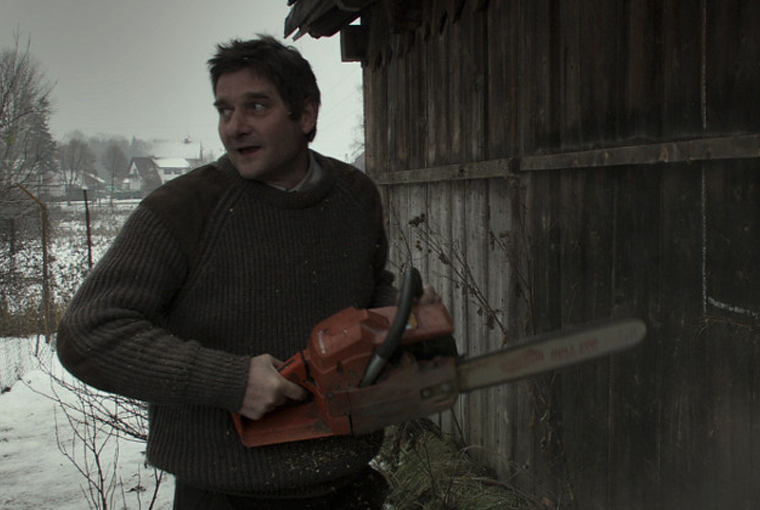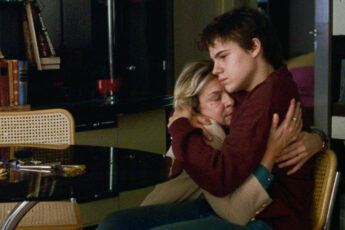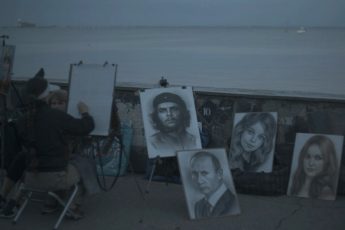Two Conceptions of Guilt
Jan Kidawa-Błoński’s In Hiding (W ukryciu, 2013) & Jerzy Skolimowski’s Four Nights with Anna (Cztery noce z Anna, 2008)
Vol. 43 (July 2014) by Konstanty Kuzma
In Hiding and Four Nights With Anna, two recent Polish productions, present us with two nontraditional (if similar) love stories. Jan Kidawa-Błoński’s In Hiding introduces us to Janina, a young woman living alone with her widowed father, who falls in love with a Jewish girl living at her house during the occupation of Poland by the Nazis. Initially reluctant to risk her life for “integrity and a Jew”, she soon grows fond of Ester – so fond that she ends up locking her up in the basement until long after the Nazi occupation, thus keeping her lover to herself. Four Nights With Anna, Skolimowski’s return to filmmaking after a 17-year-hiatus, follows a man’s illegal nighttime trips to his neighbor’s house during which she (the neighbor) lies on the bed sedated while he watches her sleeping. As Leon, the stalker, himself puts it, the routine is the delivery of his promise to his grandmother to start “seeing a woman”.
The parallelism doesn’t end here; indeed, it’s no surprise that both directors proceed by exculpating their protagonists after picturing them in relation to strong misdeeds: Ester introduces herself with antisemitic comments, while Leon is seen, in the first 10 minutes, stalking a woman and soon thereafter burning a human hand in an oven. In fact, In Hiding and Four Nights With Anna are caught up in illustrating recurring routines that are supposed to be seen differently by us over time. The crucial dissimilarity is that after watching In Hiding, we feel just as alienated from Janina as we do when she makes her first cameo, while Leon slowly earns our sympathy without us really noticing when that happens. The question is why?
Explaining how In Hiding attempts to draw us closer to Janina is rather simple, because really the film gives us only two reasons for feeling sympathetic. Firstly, we are told that Janina genuinely loves Ester. Secondly, she admits to her guilt on several instances. On a closer reading, it should become clear that neither of these proto-reasons do much by way of exoneration. Love can seem like a valid justification for an action – there are cases in which we might appeal to emotional states to relativize a crime. But Janina doesn’t even behave like a person blinded by love: after failing to win Ester over, Janina turns herself in to the authorities. Once she realizes that she is hurting Ester, Janina’s emotional state becomes irrelevant to herself. The fact that she confesses to her wrongdoings only confirms such intuitions: Janina is a conscious agent.
Diachronically, Four Nights with Anna gives us plenty of reasons for questioning our intuitions regarding Leon’s illicit behavior. Firstly, we find out that our suspecting him of murder for burning a hand turns out to be an unlucky conjecture: Leon is a cremator, hence being commissioned by profession to activities that might otherwise figure in a horror movie. Secondly, Leon is wrongly suspected (and, as we later find out, convicted) for raping a woman. Thirdly, it is the victim of this latter crime, Anna, whom he sedates and visits during the night, creating, over time, an odd bond between the two. Leon doesn’t just nominally care for Anna (as Janina does). During his unlicensed trips, he cleans up her room, washes the dishes and fixes her dress. This brings out conflicting intuitions in us: on the one hand, we condemn the visits because they are not licensed, on the other, Leon is not abusive, but instead seems to care about the fate of a person of whose misery he knows. And since Anna inevitably associates Leon with the rape (if only for the fact that he was wrongly condemned for it), it is clear that he would have no other way of “spending time” with her than doing it without her knowledge. Fourthly, Leon is evidently psychologically unstable, so that from the beginning we have no way of guessing the degree of his accountability.
Though the list could go on for much longer, there is one more aspect of guilt in Four Nights With Anna worth pointing out. Skolimowski doesn’t just meditate on the conditions of guilt, but also on its consequences: repeatedly, we are confronted with Leon’s inhumane treatment by the authorities and his fellow inmates. Independent of the question whether a given person is in fact guilty, Skolimowski thus criticizes what follows from that fact in our society. This is an idea he again pursues in Essential Killing, which confronts us with the fact that people in our society are, as Skolimowski himself has put it on several occasions, treated like animals. This is not just a question of guilt (and of whether we have sufficient evidence for that ascription), but also one of how we treat people who are guilty.
None of these arguments is supposed to show that Skolimowski’s more elaborate conception of guilt itself makes Four Nights With Anna a better film (though I suspect that there is a correlation). The reason why I wrote this article, and why I observed the dichotomy in the first place, is that contemporary Polish films are full of simplistic treatments of the question of guilt, and that this is part of the reason why most of them are not exactly thought-provoking. There, guilt is causally reduced to emotional states, evilness, or ideology, whereas no one seems to inquire why one has those emotional states, is acting in a way which we would from today’s perspective call evil, or would ascribe to one ideology rather than another. To me, Skolimowski not only represents an auteur with his own vision, but also a Golden Age of Polish Cinema which was, among other things, very ambiguous on how to ascribe terms like “guilty” at a time when making that ascription should seem easier than in today’s world.
It is important to stress that the moral ambivalence of Polish directors was, under Communism, a necessary condition for making films. The fact that the censorship apparatus in Eastern Europe allowed, ironically, the making of better films is usually read as implying either that political constraints stimulated the establishment of a refined creative vocabulary that allowed directors to say whatever they wanted to say, or that censorship qua censorship provoked the free spirit of artists and was thus merely motivational by extension. Crucially, though these explanations also seem to be part of the answer, I think that the censorship apparatus simply forced directors to differentiate: to say whatever they said conditionally, relatively, mistakably (not necessarily with the help of a vocabulary that is inherently ambiguous). In this sense, the censorship apparatus allowed directors opposed to it to make films that elude dogmatism. When this “moderating” force disappeared with the downfall of Communism, some directors, like Skolimowski, kept on making films that were undogmatic. Others, like Andrzej Wajda, embraced the newly found freedom to idealize. Katýn and Walesa, Man of Hope can indeed be criticized for the way they are directed, but they can also be rebuked for failing to remind us that the “truth” as explained in 2 hours cannot be the whole story. Unfortunately, contemporary filmmakers from Poland largely seem to follow Wajda, not Skolimowski, whether they are discussing the Second World War, historical memory, depression, family conflicts etc. How strange that freedom and democracy should make Polish cinema more dogmatic than it previously was.




Leave a Comment